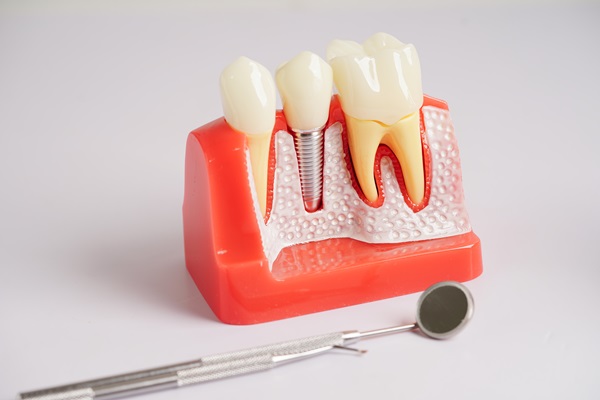Can Dental Implants Replace Multiple Teeth?

Getting dental implants is a popular way to replace missing teeth. These oral prosthetics replace lost teeth roots and are designed to last a lifetime.
Implants can be used to replace one or more teeth. Crowns, dentures, or bridges are attached to the implants, depending on the patient’s needs.
Replacing multiple teeth with dental implants
No other oral prosthetic used to replace missing teeth comes close to implants regarding their similarity to natural teeth. Implants also do not require any special care, so people who replace their missing teeth with implants can return to their regular routines. That is a significant contrast to other missing teeth replacement options, like dentures, which need to be cleaned and soaked daily.
People with multiple missing teeth can replace each tooth with an implant, but that can quickly become pricey. Getting dental implants is the most expensive way to replace missing teeth, and many people cannot afford to have all their missing teeth replaced with implants.
Fortunately, dentists can lower costs by combining implants with restorations like dentures and bridges. This leads to significant savings because dentists can often replace an entire dental arch of teeth using only four to six implants, which serve as bases for restorations like dentures.
This way, patients still get the benefits of replacing missing teeth with implants, including the bone tissues in their jaw getting the stimulation that they need to stay healthy. Most implant-supported missing teeth replacement options do not have any special maintenance requirements.
The process
Replacing multiple missing teeth with implants starts with the dentist evaluating the patient to determine if they are healthy enough to proceed. This includes going over the patient’s medical and dental history to verify that they do not have any existing issues that could complicate the recovery process.
The dentist will also talk to the patient about any medications that they are taking. Certain drugs, like blood thinners, hinder a person’s ability to heal. Recreational drugs like alcohol and tobacco also increase the risk of complications. Anyone who wants to replace their teeth with implants should be willing to give up such habits, at least temporarily.
The patient’s jawbone is examined to determine if it is thick enough for implants. Bone grafts might be needed otherwise. This can add an extra three months to the process because patients need to be fully healed before implants can be placed in their jaw.
During the surgical installation of the implant, the patient is injected with a local anesthetic before the dentist cuts into their gum tissue to reach their jaw. Holes are then drilled, in which the implants are carefully placed. Temporary artificial teeth might be attached to the implants to end the first part of the treatment.
The patient returns in about six months, once the implants have fused with jawbone tissues. The temporary teeth are removed and replaced with the customized teeth.
Frequently asked questions about dental implants
Let us go over the answers to questions that patients might have regarding dental implants.
1. How do implants preserve bone tissues in the jaw?
Implants are the only teeth replacement options that prevent the bone tissue loss that takes place when teeth fall out. That is the primary purpose of an implant. It replaces the roots that came out with the lost tooth. A cosmetic restoration like a crown is attached to it to replace the tooth's visible part.
Bone tissues need to be constantly stimulated to remain healthy, just as is the case with muscle tissues. Teeth roots keep the jaw stimulated by transferring bite forces into it. The stimulation stops when teeth fall out. Implants help keep the jaw stimulated by performing the same role as natural teeth roots. They also serve as bases for dental restorations that are used to replace the visible parts of teeth.
2. Can anyone get implants?
No. Patients need to meet a few criteria to qualify for implants. For one thing, they should be healthy enough to recover from a surgical procedure. Certain health issues, like blood-clotting problems, immune system disorders, or diabetes, can hinder the body's ability to heal. Jawbone thickness is also examined to determine if it can hold implants in place.
3. How long do implants last?
Implants can last a lifetime when appropriately maintained with good oral hygiene and biannual trips to the dentist.
Replace multiple teeth with implants
Give us a call or stop by our Gainesville clinic to learn more about how our dentist can replace multiple missing teeth with implants.
Request an appointment here: https://gallodental.com or call GDC Smiles at (770) 504-5725 for an appointment in our Gainesville office.
Check out what others are saying about our dental services on Yelp: Dental Implants in Gainesville, GA.
Recent Posts
Losing a tooth is never something that you would want to happen, but since it can be unavoidable, you should know that a dental implant is one of the top options for replacing a missing tooth. There are many advantages to pursuing this path over alternatives like dentures. It is true that dental implant installation…
A dental implants is widely considered the tooth replacement solution that most closely resembles a natural tooth in durability, functionality, and appearance. However, like natural teeth, dental implants require diligent and consistent care to ensure longevity. Incorporating proper dental implant care into your oral hygiene routine can prevent complications and keep your smile healthy for…
Curious about dental implants? Read on to learn more. Having a missing tooth or teeth can make you feel self-conscious and reluctant to smile in public. In many cases, dental implants are the preferred and popular option to resolve this issue. Besides being a functional tooth replacement, they also appear natural and fit in with…
A dental implant is the gold standard of dental restorations. It provides stability and natural-looking results. Understanding the benefits of implants can motivate you to see your general dentist about it. Here are the different oral health advantages of a dental implant.The titanium rod acts as the dental root. It merges with the jawbone and…


